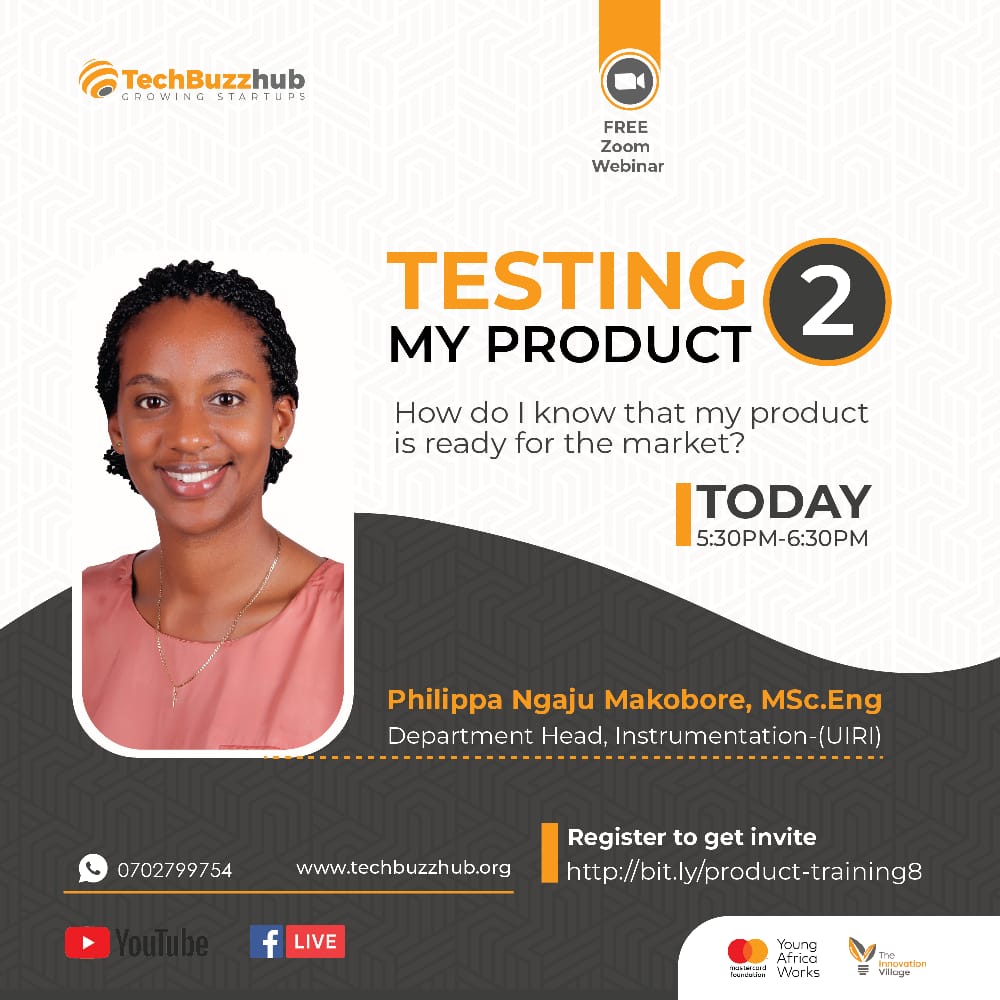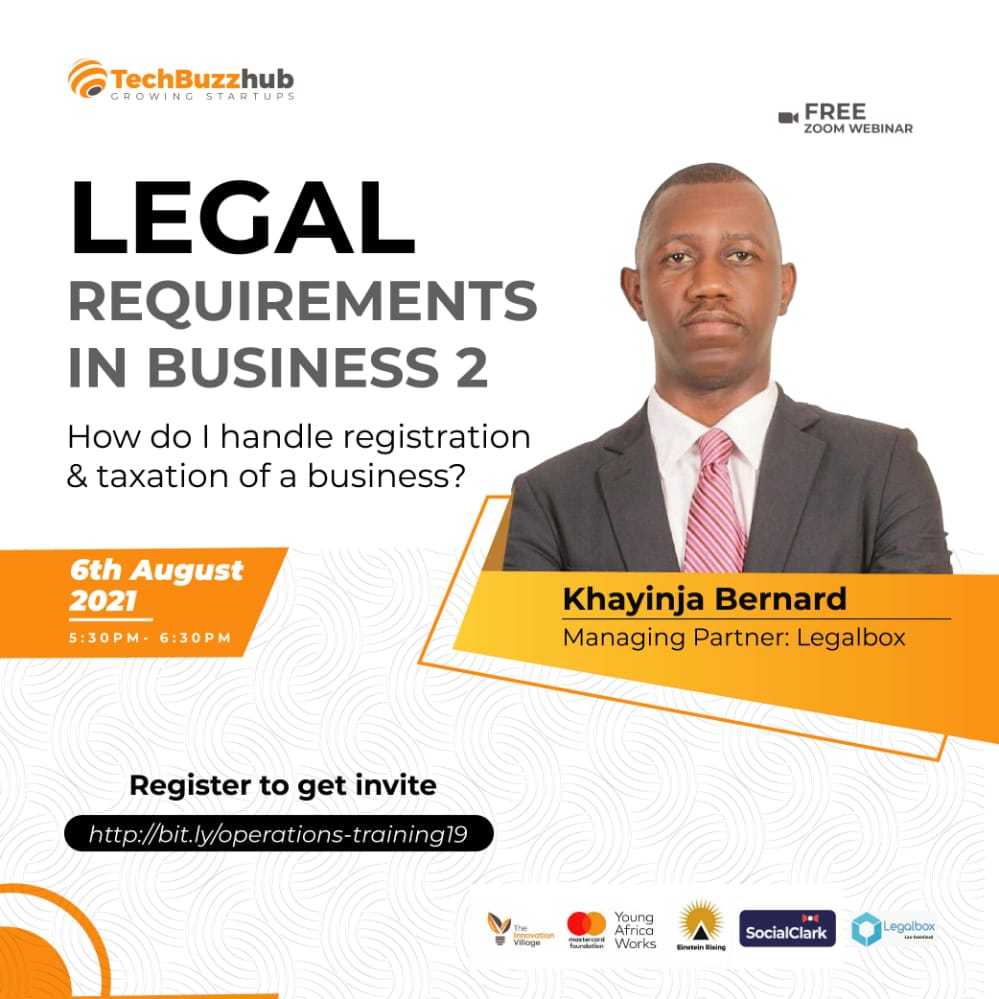PRODUCT TESTING Pt. 2 – TRAINING
| These trainings are brought to you by TechBuzz Hub in partnership with Mastercard Foundation, Young Africa Works and Innovation Village |
Because it is a very crucial topic we bring to you another version of product testing. You must surely be wondering why should we go at it twice? What better thing is there to look at? Well knowing that product testing varies with what kind of product one is having to test. We want to bring to your attention a product from another dimension of thought. On board we had Miss Philippa Makobore, a successful entrepreneur/engineer/inventor and innovator, working with Uganda’s biggest entrepreneurial support company, that is Uganda Industrial Research Institute(UIRI).
What is a product?
It’s a tool that has been created to perform a specific problem. In this case we look at something tangible, could be hardware driven by software or a mechanical product
What then is product testing.
Is when you try to evaluate your tool assesses its functionality, how it performs, based on a set of specifications and requirements. For example, a medical device needs to have safety as paramount in product testing. There are more or less three stages of product testing in the medical sense.
What do you need to have in place to have your product tested?
You must have a test protocol. These requirements include non-functional requirements like size, aesthetics and any other requirement. There are also the functional requirements like you need to know how the product is working, you will need to assess the era margin. All these should be entailed in your product testing goals. There are generally two ways of testing, these are;
- White box testing: this is usually done by the developers and the creators or innovators of the product. In a general sense the technical group.
- Black box testing: this involves someone or people who did not take part in the development of the product. So generally this is a user perspective kind of testing.
What I needed in place to have my product tested includes, having ethical approvals from the respective regulatory authorities. For example, internet testing needed its requirements thus internal ethical approval, to verify whether the product is not harmful, external
Do you need testing in all the products?
Testing is a must for all the products. It is not only for medical products or devices that need testing, even other kinds of products in the market.
How much information should one avail to his sample space?
From a medical perspective you will want to explore the area of safety which is very key in product testing. Thus for safety reasons you would also want to limit exposure. And so for my case we had to get clearance of all forms to have the product tested. This also meant that those going to get involved in the testing should know something about your product. Such as operating the device, troubleshooting in case of a system failure. In the other way it helped achieve better results.
How many people should one involve in product testing stage?
Assuming the product was developed already and this product has to be tested from a medical perspective, you may not be in a position to test the product by one self. In my case I had to bring on board other technocrats, like engineers, doctors, clinical assistants and nurses, and finally industrial designers. This was because each of them had a specific role to do at each given time.
What is the relevance of having product testing?
Product testing as earlier noted is very important in every single aspect of your business. This is because you always want to know whether your product is being accepted by the community by the society, whether or not the device is cost friendly, safe to the users, and most of all manageable. In the words of Philippa, she says, it’s very “critical” because one needs to ensure sustainability of the product.
Would you say product testing is expensive.?
The question that would come to mind is at what stage of product testing is it expensive, because when you look at testing of a product at the initial stages then it would be cheap however when it comes to research and development commonly known as R & D , the regulatory testing part of it especially in the medical field and industrial manufacturers and innovators then it is really expensive. It requires a huge capital base which is basically acquired from donations and grants. So yes the later and final stage of product testing is and can be quite expensive.
Do you think product testing can be taken on as a job to curb the unemployment gap in Uganda?
Honestly speaking, says Miss Philippa, it is very possible to grow that segment of the economy. In the western world you find quite a number of auditors, regulatory compliance assistants, certified internal auditors among others. Even in Kenya there are quite many auditors compared to Uganda. So this can be a good opportunity for growth.
In product testing and trying to attain feedback there is always a problem of patent theft. How do you advise a young entrepreneur to safeguard against that?
The fear of intellectual property theft is a very modern and important aspect in your product sustainability in the market. Therefore, to avoid it, do not share the novo aspects of your product with any one apart from yourself irrespective of where you have taken the product for pitching or showcase.
Indeed, acquiring an IP for your product is the only assured safe way, and this you can involve the Uganda National bureau of standards to help you get you good lawyers that can help in the matter. If you don’t have the money, then remaining safe is way better.
The underlying statement is that the process of product testing takes twists and turns varying from the kind of product you are testing. The methodology may not be straight as we have seen in the two encounters, however the end result is always the same. A consumable product like juice may have a different criterion, as compared to a hardware device, or even software product. The benchmark still remains that the entrepreneur must look out for the acceptability and viability of the product.
Thanks once again for engaging with us on this topic please wait for more good practical information. Remember to attend the webinars that are hosted by Techbuzz hub to get a clear understanding of these topics that mentor you in business activities today. Till next time.
Martin Moses Andama
TechBuzz hub.
Related Posts
Leave a Reply Cancel reply
Categories
- Art (6)
- Business (22)
- Clients (2)
- Design (1)
- Entrepreneurship (22)
- Events (28)
- Innovation (8)
- Inspiration (17)
- Motivation (7)
- Startups (22)
- Tips & tricks (6)
- Uncategorized (2)






